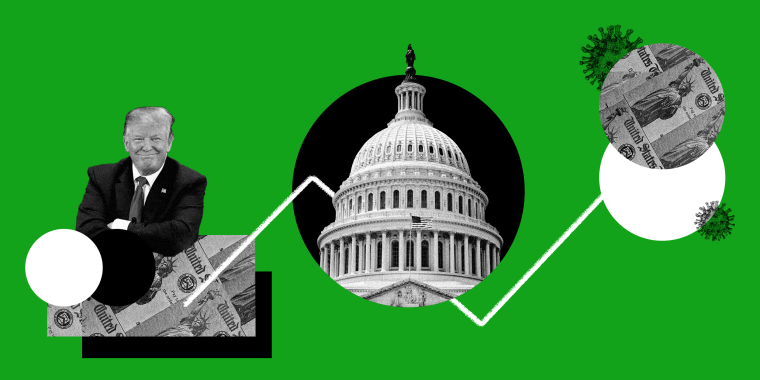Nobody said that getting President Joe Biden’s Covid-19 stimulus package through Congress would be easy. But Republicans really have chosen to make it as hard as possible, and for the flimsiest of reasons.
Democrats should absolutely do what it takes to win over GOP support and reduce the debt this package would incur.
We hear two main categories of complaint from GOP senators. First, that the bill is too large, too soon and, most important, that the U.S. can’t be adding this much to the deficit even though the country has been dealing with a pandemic for almost a full year. Second, they object to Democrats setting themselves up to pass the package without Republican votes if necessary.
Senate Minority Leader Mitch McConnell even promised on Wednesday to force Democrats to vote on things even the GOP doesn’t want to pass, as punishment for moving so quickly and without Republicans’ input on how to help fewer Americans.
Look, folks, the fact is the $1.9 trillion package Biden laid out might get whittled down some during the bipartisan negotiations underway. But I’m willing to bet that anything that costs much more than the minimalist proposal a group of Republican senators produced won’t gain many — if any — GOP votes in the process.
I’ve been through why Republicans suddenly thinking deficits are bad again was both long-coming and completely ridiculous. But let’s take them at their word for a minute.
In that case, Democrats should absolutely do what it takes to win over GOP support and reduce the debt this package would incur. The easiest solution: put the Trump tax cuts on the table.
All together Biden’s proposed changes are poised to raise federal coffers by at least $3.1 trillion over the next decade.
It makes perfect sense. In 2017, the GOP-controlled Congress used budget reconciliation to pass the changes to the tax code that ended up costing up to $2 trillion in lost revenue for the United States over the next decade. That in turn prompted the federal debt to balloon by $3.9 trillion during former President Donald Trump’s term. (We’ll leave aside the massive hole blown into the budget last year thanks to the pandemic.)
So, if we’re to take Republican demands that the deficit be kept down seriously, it’s only fair to look at new revenue, which was not included in the original package.
Now, Biden has said that he doesn’t want to roll back all of the Trump tax cuts — just those on the wealthy and corporations, which feels fair in the middle of a pandemic. You don’t necessarily want to raise taxes on the people whose wages have failed to keep up with inflation. According to a New York Times analysis, doing so would net about $500 billion over the next 10 years.
If that’s not enough to offset the deficit in Republican eyes, well, good thing there’s the rest of Biden’s tax plan to add in. All together Biden’s proposed changes are poised to raise federal coffers by at least $3.1 trillion over the next decade, the University of Pennsylvania’s Penn Wharton Budget Model estimates. May as well get that in the stimulus package, too, if this is what Republicans really want to argue.
OK, so that’s more than the cost of the full package and then some covered with new revenue increases. Will that win over moderates in support of Biden’s complete proposal? Not likely. As part of Treasury Secretary Janet Yellen’s confirmation, Sens. Todd Young of Indiana and Rob Portman of Ohio — both GOP members of the moderate bipartisan negotiating group I mentioned earlier — peppered her with written questions expressing concerns about repealing the Trump cuts. The rest of the caucus doesn’t seem too thrilled either.
Why wait for another fight when it’s clear that this one has already escalated?
But repeal would do a few things that will be helpful in the long run: First, it would actually begin adding the revenue that Biden will need for the rest of his agenda. Yellen, during her confirmation hearing, pledged that the president would wait to repeal the Trump cuts specifically, which The New York Times speculated meant it would be part of Biden’s pending infrastructure proposal. But why wait for another fight when it’s clear that this one has already escalated?
Second, it nullifies two key GOP arguments: that stimulus spending is an unpaid-for addition to the national debt and that reconciliation is the wrong way to pass this kind of legislation. The Trump tax cuts came into this world with just 51 votes and over Democratic objections. It seems fitting that they’d leave it the same way — with the important distinction that the people who supporters say would benefit from the bill would actually benefit this time around.
And third, it would serve as a reminder to the GOP opposition that what they are experiencing is Democratic courtesy. If the only negotiations that need to take place are within the ruling party, then there are a lot of things that could muster the votes to pass via reconciliation in this initial package.
Congress is getting ready to settle into the hard work of actually writing this bill in both houses of Congress. Speaker Nancy Pelosi and Senate Majority Leader Chuck Schumer should make it clear that this is serious. And if Republicans would, say, vote for a stimulus bill without revenue increases after all, more power to them.

